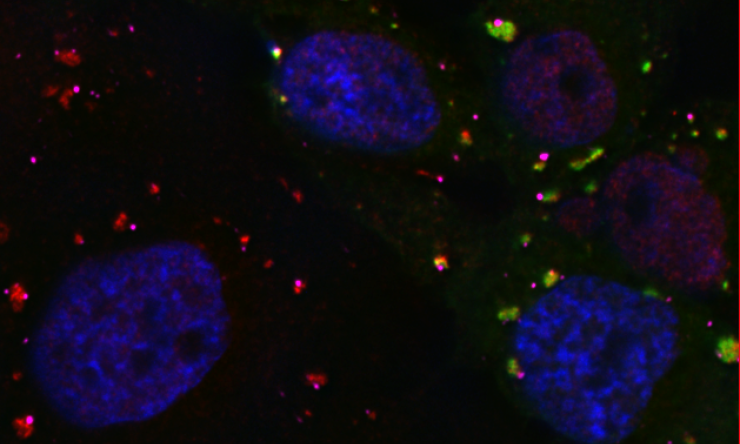About the Lab
The Lloyd Lab main research focus is the enterovirus infection triggers of integrated stress responses and Type 1 Diabetes. Enteroviruses such as poliovirus and coxsackievirus shut off cap-dependent protein synthesis (translation) within two hours of infection while allowing cap-independent translation of mRNAs containing internal ribosome entry sites (IRES) to continue. Cap-dependent translation produces 95% of all cellular proteins, and enteroviral 2A protease (2Apro) and 3C protease (3Cpro) are viral proteins cause translation shutoff by cleaving key translation factors eIF4G1 and poly(A) binding protein (PABP). Cytoplasmic RNA granules ((Stress Granules (SG) and P-bodies) function in translation regulation by sequestering translationally-silenced mRNAs but also play prominent roles in the integrated stress response. We found that enterovirus 3Cpro cleaves a protein G3BP1 that is critical for nucleating SG formation.
Recent work in the lab has shown that G3BP1 nucleation of SG requires reversible methylation on arginine residues in its C-terminal domain, and that SGs function as platforms for activation of specific arms of the innate immune response critical for defense against virus infection. SG are now emerging as platforms that activate innate immunity. We found that G3BP1 nucleation of stress granules activates PKR, resulting in phosphorylation of eIF2alpha and activation of NF-kB and IFN signaling pathways. This demonstrates that cellular stress responses interface with innate immune pathways to form an integrated stress response that senses virus infection in new ways. Current research is focused in these two areas.
The Lloyd lab is also involved in two large international multi-investigator projects that seek to determine the cause of Type 1 diabetes (T1D). A large body of evidence has implicated infection with enteroviruses such as Coxsackievirus B3 as a triggers or etiology driving autoimmune dysfunction that causes diabetes. Dr. Lloyd is in the Network for Pancreatic Organ Donors Virus Working group (nPOD-V), a consortium performing analysis of pancreas and other tissues from persons with T1D, and we have found enterovirus RNA in human pancreas of persons with T1D. The findings emerging from this consortium study suggest that enteroviruses cause persistent, very low level infections in human pancreata that may trigger autoimmunity through a novel interferon response signature and elevated expression of MHC class 1. Current work in the lab is establishing experimental enterovirus infection models in human and mouse pancreatoids to determine both mechanisms of establishment of persistent infection and host responses in beta cells or any other infected pancreatic cells that could activate autoimmunity.
Dr. Lloyd, together with Dr. Joe Petrosino in the Molecular Virology and Microbiology Department and BCM Center for Microbiome and Metagenetics are also collaborating on the large clinical prospective TEDDY study directed by NIDDK. TEDDY seeks to determine the environmental trigger(s) for development of T1D. We have very performed virome analysis involving 13,000 human stool samples which has revealed strong linkage of enterovirus infection to development of autoimmunity. Virome analysis is continuing with nasal samples and blood buffy coat samples in this study.
Lab Members
View a listing of the Lloyd Lab members along with links to their bios.
Research Areas
The Lloyd Lab research studies and projects are in the areas of:
- RNA Granules and Virus
- Type 1 Diabetes and Virus
Lab News
Unexpected viral behavior linked to type 1 diabetes in high-risk children
Investigators at the Baylor College of Medicine, the University of South Florida, and other institutions studied samples available through the TEDDY study.








 Credit
Credit



